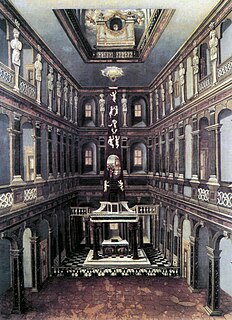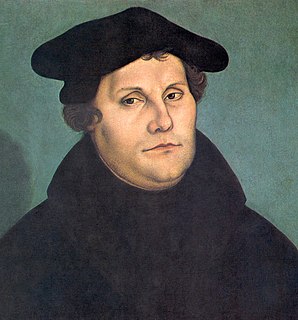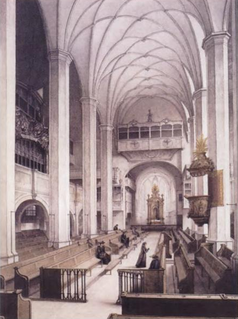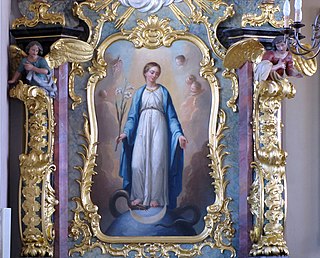 W
WÄrgre dich, o Seele, nicht, BWV 186 is a church cantata by Johann Sebastian Bach. He composed it originally in Weimar in 1716 for Advent, BWV 186a, and expanded it in Leipzig in 1723 for the seventh Sunday after Trinity, where he first performed it on 11 July 1723.
 W
WJohann Sebastian Bach composed the church cantata Bereitet die Wege, bereitet die Bahn, BWV 132 in Weimar in 1715 for the fourth Sunday of Advent and led the first performance on 22 December 1715.
 W
WHerz und Mund und Tat und Leben, BWV 147.1, BWV 147a, is a cantata by Johann Sebastian Bach. He composed it in Weimar in 1716 for the fourth Sunday in Advent, 20 December. It is uncertain if the work was performed then. He later expanded the work in 1723 as Herz und Mund und Tat und Leben, BWV 147.
 W
WMessiah, the English-language oratorio composed by George Frideric Handel in 1741, is structured in three parts. The wordbook was supplied by Charles Jennens. This article covers Part I and describes the relation of the musical setting to the text. Part I begins with the prophecy of the Messiah and his virgin birth by several prophets, namely Isaiah. His birth is still rendered in words by Isaiah, followed by the annunciation to the shepherds as the only scene from a Gospel in the oratorio, and reflections on the Messiah's deeds. Part II covers the Passion, death, resurrection, ascension, and the later spreading of the Gospel. Part III concentrates on Paul's teaching of the resurrection of the dead and Christ's glorification in heaven.
 W
WJohann Sebastian Bach composed the church cantata Nun komm, der Heiden Heiland, BWV 61, in Weimar for the first Sunday in Advent, the Sunday which begins the liturgical year, and first performed it on 2 December 1714.
 W
WJohann Sebastian Bach composed the church cantata Nun komm, der Heiden Heiland, BWV 62, in Leipzig for the first Sunday in Advent and first performed it on 3 December 1724. The chorale cantata is based on Martin Luther's Advent hymn "Nun komm, der Heiden Heiland". It is part of his chorale cantata cycle.
 W
W"This Is the Record of John" is a verse anthem written by the English composer Orlando Gibbons (1583–1625). It is based on a text from the Gospel of John in the Geneva Bible and is a characteristic Anglican-style composition of its time. "John" refers to John the Baptist. The piece is divided into three sections, each beginning with a verse for solo contratenor followed by a full section, echoing words of the verse. The singers are usually accompanied by organ: a viol consort is another possibility, although it is debatable how frequently viols would have been used in Jacobean services.
 W
WJohann Sebastian Bach composed the church cantata Schwingt freudig euch empor, BWV 36, in Leipzig in 1731 for the first Sunday in Advent. He drew on material from previous congratulatory cantatas, beginning with Schwingt freudig euch empor, BWV 36c (1725). The Gospel for the Sunday was the Entry into Jerusalem, thus the mood of the secular work matched "the people's jubilant shouts of Hosanna". In a unique structure in Bach's cantatas, he interpolated four movements derived from the former works with four stanzas from two important Advent hymns, to add liturgical focus, three from Luther's "Nun komm, der Heiden Heiland" and one from Nicolai's "Wie schön leuchtet der Morgenstern". He first performed the cantata in its final form of two parts, eight movements, on 2 December 1731.
 W
WVirga Jesse, WAB 52, is a motet by the Austrian composer Anton Bruckner. It sets the gradual Virga Jesse floruit for unaccompanied mixed choir.
 W
WWachet auf, ruft uns die Stimme, BWV 140, also known as Sleepers Wake, is a church cantata by Johann Sebastian Bach, regarded as one of his most mature and popular sacred cantatas. He composed the chorale cantata in Leipzig for the 27th Sunday after Trinity and first performed it on 25 November 1731.
 W
WWachet! betet! betet! wachet! is the title of two church cantatas by Johann Sebastian Bach. He composed a first version, BWV 70a, in Weimar for the second Sunday in Advent of 1716 and expanded it in 1723 in Leipzig to BWV 70, a cantata in two parts for the 26th Sunday after Trinity.